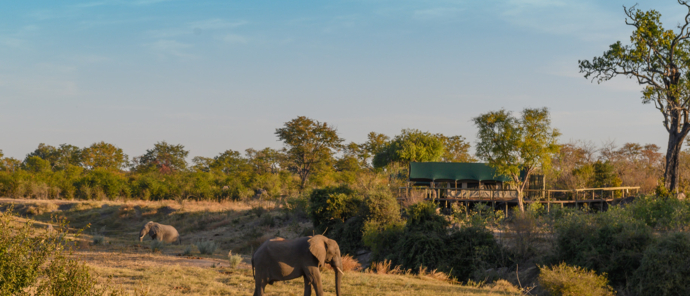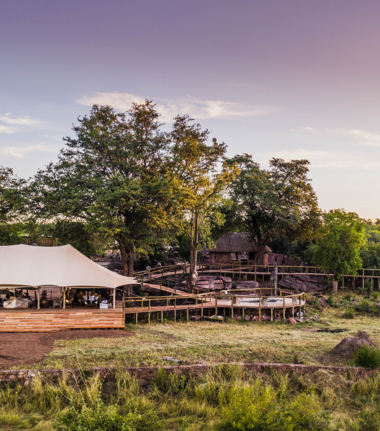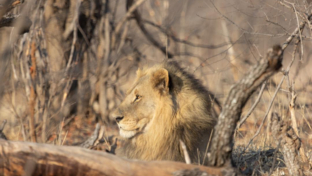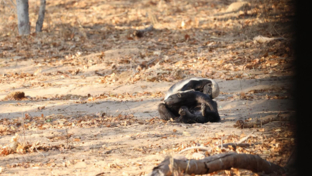Deteema Springs Wildlife Report October 2024
The first week of October at Deteema had quite unusual weather. It was much colder than previous years, with daytime temperatures between 10 to 16 degrees Celsius and nighttime temperatures below 10 degrees. After the initial week of odd weather, temperatures rose to normal summertime levels.
Attract and Protect
An estrus cycle is a set of physiological and sometimes behavioural changes that mammals go through induced by their reproductive hormones, but did you know that this can also be faked?
We spotted two lionesses feeding on a fully-grown male buffalo while another shy male lion watched in the distance. The females had spent four days at the kill, waiting for the rest of their pride. However, as we watched the trio of lions, we realised that the male did not belong to the females’ pride. In fact, they were trying to keep him away from their pride so he would not attack their cubs.
By faking their estrus cycles, the lionesses kept the male interested in mating with them until their pride’s dominant male came back to confront the rival male. The females lured the rival male away from their pride, keeping their focus on them almost tauntingly by mimicking their characteristic mating calls to fool the male. Later, we saw the whole pride start to settle near Deteema. Unfortunately, there wasn't much left of the buffalo when the rest of the pride found it. Lions are not an uncommon sight, but it is rare to see females manipulating a rival male in this way.
Playfully Painted
It's not often that we spot African wild dogs, but when we do, it is always an amazing experience. We spent two days tracking and couldn’t find a single one, but on the third day, we found 23 at a nearby salt pan! We were excited to see what looked like a well-nourished pack. Their tummies looked full, and their faces were covered in blood. Their four-month-old pups also looked healthy and were playing with each other and nipping at the adults’ tails.
Later that day, the pack each took turns dipping themselves in a mud pool. They were having so much fun they didn’t even spare us a single glance. Impalas and baboons wanted to drink from the pool, but the wild dogs decided they would spend the whole day there so no other animals could come close without risking becoming their next meal.
Deteema Lion Population
In most wildlife areas, lion populations are low due to various factors that including low birth rate, rival males, infanticide, and bushfires. Thus, densities in the lion population can vary from place to place. Here at Deteema Springs Camp, we are quite fortunate to have a healthier lion population than most areas.
Recently, the resident pride of 30 lions was spotted near the camp with their cubs. The pride was divided into smaller groups of six to twelve lions. While still part of the larger pride, each group hunted independently, ensuring enough food to sustain everyone.
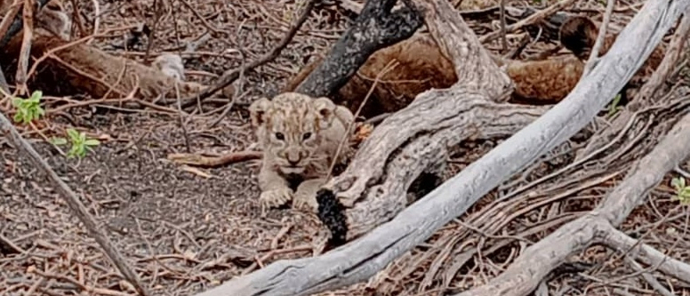
Don’t Forget The Little Guys
Creatures like the giant-plated lizards, dwarf mongoose, African common skink, common blue-tailed skink, red-billed francolin, Smith’s bush squirrels and various other little animals can be found all over camp. They might not be as rare as seeing an African wild dog, but just observing these small critters for a little bit reveals interesting behavioural patterns.
Each of them is classified as water-independent, meaning they can go for a very long time without drinking any water. However, if they have easy access to a water source, they will take advantage of it and drink frequently. Another example is the giant-plated lizards. These reptiles are very resourceful and can find food with their sense of smell. Be it a piece of fruit or the carcass of another giant-plated lizard, they are very capable survivalists.
Elephant Environmentalists
Balancing one's survival and the environment can be achieved even if one isn't aware of it. A great example is the elephants we find here at Deteema. The elephants here can be seen debarking and even eating the tree trunks until the trees topple over. During periods of drought, the elephants engage in this behaviour, but in the rainy season, they return in large numbers to drink from watering holes.
We’ve observed large herds of elephants with over 100 members. However, when they feed on trees like baobab, star chestnut, and marula during the dry season, they only gather in numbers of about 30. This behaviour avoids putting too much pressure on the plants and trees, ensuring they can have a food source in the future.
Until next time,
Ophious
Deteema Springs Camp
